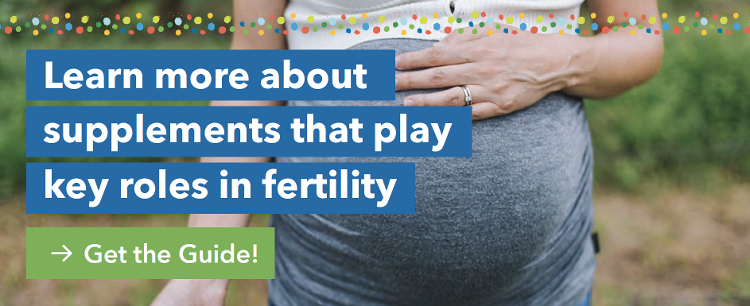
By Stephanie O'Neill Bhogal DC, DICCP
In the U.S., fertility rates have hit an all-time low for the 4th year running, with the general fertility rate averaging out at 59 births per 1,000 women.
While a number of socio-economic factors can be attributed to a decrease in fertility—such as a spike in divorce rates, an increase in women entering the workforce, and an increase in the age of women bearing children—the bottom line is that the major factors involved come down to the health of the individuals.1
Although many women have been taught to avoid alcohol, drugs, certain prescriptions, and foods during pregnancy, preparing fertile grounds for optimal chances at conceiving is less studied, and clear findings on what works and what doesn’t are only now beginning to surface.
Does Your Diet Really Affect Your Egg Health?
A healthy diet provides the body proper nutrients so that it can fully function. The food we consume doesn’t only provide us with the building blocks to keep our bodies moving and our minds clear, but it also helps keep our hormones balanced.
Fertilization involves several hormones—including progesterone, estrogen, luteinizing hormone (LH), and follicle-stimulating hormone (FSH)—that can be easily imbalanced with processed foods laden with chemicals, sugars, salts, and additives. Thus, a diet that contains a majority of whole foods such as vegetables, fruits, whole grains, legumes, and protein is always recommended—not just for women who are planning on becoming pregnant, but for all individuals.
A recent review found evidence regarding some of the nutrients previously thought effective in increasing chances of fertility.2 The results showed:
- Vitamin D and antioxidants do not play an important role in fertility or have a significant benefit for women undergoing infertility treatment
- Alcohol and caffeine have little to no effect on chances of fertility, though both can have deleterious effects on the fetus during pregnancy
- Soy did not have any harmful or negative impact on fertility; women undergoing IVF who took the highest levels of soy isoflavones (28mg/day) had a 77% increase in live childbirth compared to those who didn’t take any soy products
- Adding just one extra serving of meat (red meat, chicken, turkey, processed meats, or fish) per day was associated with a 32% increase in the risk of ovulatory fertility; fish, in particular, is concerning as the benefits of fatty acids may be outweighed by the amount of contamination in the fish, depending on the source
- Long-chained omega-3 fatty acids, in combination with a lower intake of trans fatty acids, had benefits for enhancing female fertility
- Increased intake of folate extends beyond helping prevent neural tube defects (NTD) in the developing child, as evidence showed that folate intake is associated with a lower frequency in anovulation in healthy women and a higher probability of live births in women undergoing IVF
One of the key takeaways from this review is that an increased intake of folate (approximately 800µg/day) may increase a woman’s chances of becoming pregnant and reduce risks of early termination.3 So, how do you increase your folate intake and begin to prep your body for pregnancy with optimal egg health?

How to Incorporate Folate Into Your Diet
In addition to eating a clean diet of whole foods, incorporating folate into your diet can be easy and simple, as there are many healthy options that can supplement any recipe. Legumes, such as lentils and beans, are the greatest source of folate, with one cup of cooked lentils containing 358µg of folate! Other vegetable options include greens like asparagus, brussels sprouts, beetroot, broccoli, avocado, arugula, and spinach. Those looking for sweeter options can satisfy their cravings with citrus fruit, as one large orange contains about 55µg of folate.
While this may seem difficult to attain when looking at one ingredient at a time, the beauty of cooking is that it allows you to blend the ingredients of your choice to create a meal that is flavorful and also packed with the nutrients needed to promote fertility health. The Mediterranean diet is a popular option for many women looking to increase their folate intake, with its emphasis on legumes, vegetables, nuts, seeds, whole grains, and olive oil.
Dietary supplementation of folate is preferred and, if not possible, can be supplemented with over-the-counter options. Before purchasing a vitamin or a prenatal multi-vitamin, women should note that while many professionals and some clinical studies talk about folic acid and folate interchangeably, they are not identical, nor is the way the body processes them.
Folic acid is the oxidized synthetic form of folate and is primarily used in dietary supplements and in many of the commonly fortified foods. Unlike natural folate obtained from your diet that is metabolized into tetrahydrofolate (THF) in the small intestines, folic acid has to undergo an enzymatic breakdown in the liver with the help of the enzyme dihydrofolate reductase.
A Well-Balanced Lifestyle Is Key to Optimal Egg Health
Selecting the healthiest options for yourself and your future child must be part of a larger lifestyle choice. Our bodies must process everything we put inside them, so choosing a diet that consists of nourishing whole foods and fresh produce will ultimately create more balance in the body.
Folate is a supplement with promising results in relation to fertility and prevention of NTDs and is accessed easily in a variety of foods and supplements. Being discerning in the source of folate you consume will reduce your chances of any adverse effects that may be associated with higher levels of folic acid.
Taking a more proactive approach towards your fertility by planning ahead and adapting your lifestyle will not only benefit you overall, but will increase your reproductive health in the process. This creates the optimal environment for yourself and your baby.

Stephanie O’Neill Bhogal DC, DICCP did her undergraduate studies at McGill University in Montreal,
Canada and received her DC degree from Palmer College in Davenport, IA in 2002. She completed her
Pediatrics residency at Palmer College in 2005 when she also received her Diplomate in Clinical
Chiropractic Pediatrics (DICCP). Dr. O’Neill has taught Obstetrics and Pediatrics at both Palmer college
of Chiropractic and Life Chiropractic College West. With 17 years of professional experience, both
teaching and in private practice, her focus is on routine and complex pediatric and pregnancy care. Dr.
O’Neill presents regularly at national and international conferences. She also teaches in the ICA
(International Chiropractors Association) Pediatric Diplomate program and is proud to serve as the chair
of the ICA Council on Chiropractic Pediatrics. Dr. O’Neill enjoys travelling and service through Peak
Potential Outreach, a non-profit foundation she and her husband founded to provide healthcare to
underserved countries around the world.
1 “Is the U.S. Fertility At An All-Time Low?... - Pew Research Center.” 2019. https://www.pewresearch.org/fact-tank/2019/05/22/u-s-fertility-rate-explained/. Accessed August 12, 2019.
2“Diet & Fertility: A Review - NCBI.” 2018. https://www.ncbi.nlm.nih.gov/pmc/articles/PMC5826784/. Accessed August 12, 2019.
3 “15 Healthy Foods That Are High In Folate - Healthline.” 2018. https://www.healthline.com/nutrition/foods-high-in-folate-folic-acid. Accessed August 12, 2019.


















